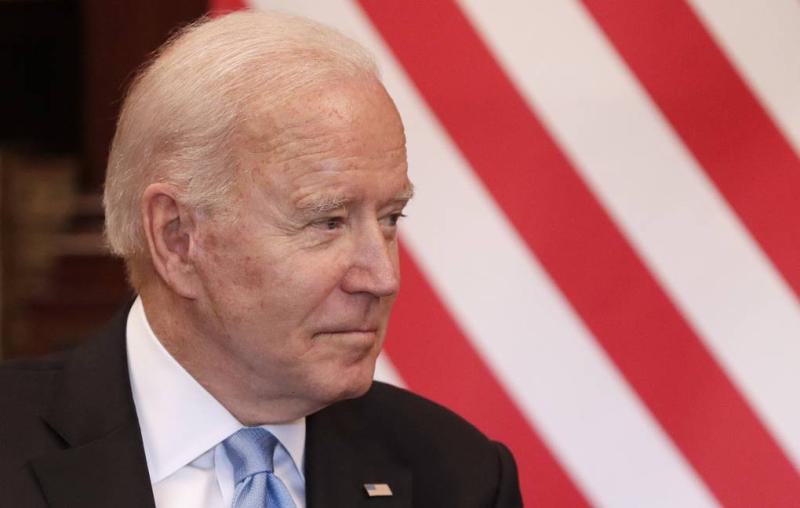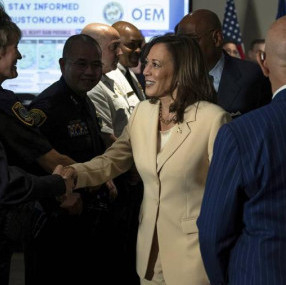
© Mikhail Metzel/TASS
Following the visit by Chinese President Xi Jinping to Moscow, the United States fears that Beijing may move Washington aside along the Ukrainian track. And White House's intractability may cost Joe Biden dear in the 2024 presidential race, if he eventually deicdes to run. This is at least indicated by his current record-low rankings. As revealed by the latest Associated Press–NORC survey, the number of people approving of his performance, economic course and foreign policy is 38 percent, 31 percent, and 39 percent respectively. The swingeing majority of US voters still do not want to see Biden in the next election campaign. Even among his fellow Democrats, the idea is only supported by 37 percent.
For fairness' sake, his key rival Donald Trump cannot boast of more trust — its level only accounts for 33 percent, according to the same AR–NORC. However, another Republican hopeful enjoys high figures (56 percent), and he is Florida Governor Ron Desantis. So, if the ruling party seeks to stay in the White House after 2024, they'd better abstain from placing their bet on Joe Biden.
Anyway, let's get back to China's impact on the US elections. Xi Jinping's meeting with Vladimir Putin in Moscow has undoubtedly put the Biden administration "in an uncomfortable position," as noted by the American media, primarily because of detailed discussions of the Chinese peace plan for Ukraine. US officials have publicly questioned Beijing's initiative, pointing out that the proposed ceasefire will actually secure territorial acquisitions for Russia in course of its special military operation launched in Ukraine a year ago. Besides, Xi Jinping's talks in Moscow and the Chinese proposal to resolve the crisis have caused serious concern with the Biden administration, which, in turn, raises questions about a more balanced US approach to Russia and China.
According to senior fellow at the American Center for Strategic and International Studies (CSIS) Bonnie Lin, "China is likely to say more often that the United States opposes the ceasefire and will try to spin everything in such a way as to try to present the United States in the most negative light." This could cost the White House the loss of its overseas allies, Ms. Lin argues. And Executive Director of the Asia office of the International Institute of Strategic Studies James Crabtree noted in a column for the Foreign Policy magazine that "while Beijing’s 12-point peace plan for Ukraine was not taken seriously by either Ukrainian or Western officials, China’s recent brokering of a Saudi-Iranian détente shows Beijing can nonetheless wield formidable diplomatic clout."
In turn, PRC's chief diplomat Wang Yi urged the European Union to contribute to resolving the conflict in Ukraine. "Ceasefire, resumption of peace talks and political settlement of the crisis should become the strategic consensus between China and the EU," he stressed. Wang Yi's stance is quite explainable, because present-day EU remains China's major trade and economic partner worldwide. Their bilateral trade turnover amounted to $847 billion in 2022, which is even higher than that between China and the United States ($760 billion).
As if hearing Wang Yi's call, Spanish Prime Minister Pedro Sanchez will visit Beijing this week to discuss the Chinese initiative on Ukraine, and French President Emmanuel Macron will follow suit in early April, perhaps with the same purpose of considering the peace plan. Sanchez and Macron might have certain relevant proposals, unlike Joe Biden himself. The fact that the White House has so far even failed to formulate its goals in Ukraine, let alone plans to settle the conflict, is a clear proof of that. This seems all the more strange amid public calls for the authorities to report on reasons for sponsoring the Kiev regime.
Opinion polls show that most Americans do not support Washington's policy towards Russia and Ukraine, with the number of skeptics having for the first time exceeded the number of "hawks". For instance, the Institute of Democracy found out that the relative majority do not object to allowing Ukraine lose in its military confrontation with Russia – 43 percent against 41 percent. US citizens are quite satisfied with Kiev's military defeat if prices stop skyrocketing.
Beyond a shadow of doubt, Joe Biden has miscalculated his China policy. As senior research fellow on East Asia at the Quincy Institute Michael Swaine said in an interview with Newsweek, the West's sharp criticism of the Chinese stance on the war should have "build on Beijing's hesitation". But in fact, it only pushed Russian President Vladimir Putin and Chinese President Xi Jinping to further rapprochement. "It is entirely unrealistic to expect Beijing to come out in full opposition to its only significant strategic partner in countering what it sees as a full-blown U.S. campaign to contain and weaken China and overthrow the Chinese Communist Party," Swaine said. And the recent visit by the Chinese leader to Moscow has been plain evidence of this.
Notably, one of the main critics of Joe Biden is still former US President Donald Trump, who has already announced intention to run for presidency in 2024. And he never misses his chance to touch upon the "Chinese factor" in his criticism. Even before the leaders of Russia and China met in Moscow, he said: "The Biden administration has driven Russia, right into the arms of China. <...> They have a big beautiful alliance right now."
Following Xi Jingpin's visit to Russia, Donald Trump told his supporters in Texas that President Vladimir Putin and his Chinese counterpart discussed the world order for the next hundred years. "If you saw the other day with President Xi, smart, top of his game, President Putin, smart, very smart people, standing there talking about the world order for the next 100 years," Trump said. He deems Russia and China as an integral unit now.
Well, once the ex-president of the United States believes so, it is obviously true.









